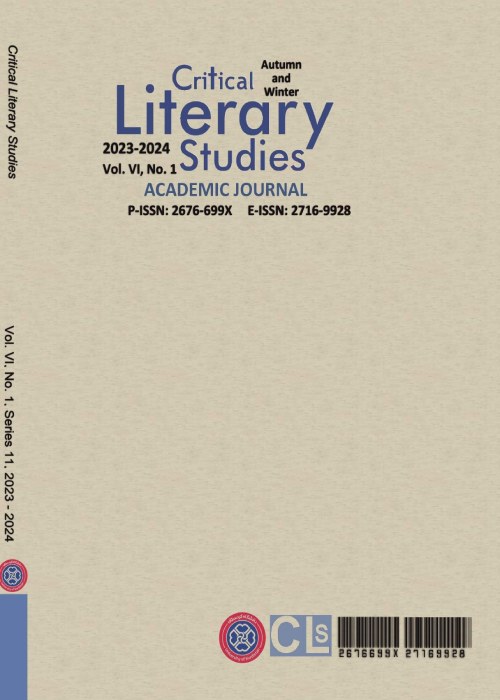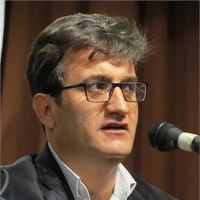Editorial Note
Author(s):
Article Type:
Editorial (دارای رتبه معتبر)
Abstract:
Publishing an academic journal concerning English literature and the exploration of a given text in terms of contemporary critical approaches is a significant endeavor with both its pains and joys. This characteristic feature appears to be more tangible when the number of the similar attempts throughout the whole country is surprisingly low. If we review major developments in the area of English literature in what is generally referred to as the Iranian academic discourse in the past few decades, we will immediately find out that, to our big surprise, there has occurred no major attempt in publishing an academic journal in this field of study nationwide.
Having been first addressed by Plato in the fifth century B.C. down to the present day, literary criticism and theory, in its general sense, is new in that it began to sprout as an academic discipline only in the past few decades. Literary theory is still ‘new’ to a number of professors of literature and the human sciences in some of the universities of the world. The question of the practicality and authenticity of literary theory has become so critical that one can clearly observe the split of the professors of the departments of, for example, English into two major groups: one group contributing to literary theory, and the other group simply ignorant of or rejecting it.
The close and one-to-one association between literature, on one hand, and the other fields of study in the Humanities including philosophy, psychology, sociology, and anthropology, on the other hand, has paved the way for a number of re-readings and re-evaluations of literary texts according to different approaches provided by diverse theories barrowed from these disciplines. The interdisciplinary nature of contemporary literary theory is in itself another reason that supposedly makes it rather separated from the departments of English or other languages. However, as managed in a number of western and recently Iranian universities, literary theory has been gifted an independent character and, as followed in other universities, it is treated as a self-contained discipline in the closely related departments.
The interdisciplinary character of literary theory makes it a field of study that is permanently shuttling back and forth between literature and the specific academic subject on which it is theoretically based. For example, a psychological approach to literature ultimately comes up with a psychological literary theory; that is, a theory that is about and constituent of both literary criticism and psychology. The same feature is explicitly manifested in the other subcategories of literary theory such as sociological and mythological literary theories. Structuralism, to bring another example, focuses on both literature and linguistics whereas Post-Structuralism seeks to present a philosophical interpretation of language, literature, and culture.
Similarly, one can also address another subgroup in contemporary literary theory that is different from the above examples. The theories presented in this subgroup are founded upon specific philosophical or even cultural schools of thought. Phenomenological, Feminist, New Historicist, Post-Colonialist, and Deconstructionist literary theories, to name only a few, are categorized in this subgroup. Obviously, the approaches provided here are not only extensively distinguishable from, but also in opposition to, each other at a large scale. For example, Feminist literary theory proposes a project that is opposite to the ‘male-dominated’ tradition of literary criticism. The other theoretic controversy is, to bring another example, between New Historicism and Deconstructionism. New Historicist theory’s interest in searching for the true historical facts based on arts and literature finds itself in sharp contrast with the Deconstructivist repudiation of the concept of truth as human beings have ever thought of.
The immediate conclusion we arrive at is that literary theory is not only new and interdisciplinary but also a perplexing area of scholarship that offers different and sometimes contradictory views on a given text or concept. Although the term literary theory, because of its generality and recent universality, seems to be not a perplexed discipline, it really embodies these heterogeneous premises. However, one should not be misled by such an immediate conclusion. In other words, in order to avoid any misconception one should not think of literary theory as an organic unity the constituent parts of which are all in accordance with each other. Literary theory, on the contrary, is a general term for a number of different critical approaches to literature, each one of which based upon a specific worldview or school of thought.
Therefore, by literary theory as an independent academic discipline we really mean ‘literary theories,’ the different sub-categories of which are sometimes in opposition to each other. Furthermore, there is most often a philosophical base for a certain literary theory. That is why to account for a specific literary theory means to account for that philosophical school upon which it has been founded. Considering the direct impact of the other areas of the human sciences on literary theory and criticism in the last decades of the twentieth and the early twenty-first century, one might regard literary theory as an area of study in which the findings of all human sciences meet, influence, and promote each other.
Contemporary Literary and Cultural Studies is the first and, for the present time, the only academic English journal in the area of English literature and literary theory in the Iranian academic discourse. The editorial board of the journal includes prolific academicians and versatile researches all well-known and well-liked. The contributors are mostly brilliant and energetic young researchers in the field. The CLCS’s team of reviewers includes members form different universities both in Iran and abroad. The ultimate goal of the CLCS is to present world class researches to both our Iranian and international readers and researchers.
I would like to sincerely thank the academic members of the department of English in the University of Kurdistan. Furthermore, I should express my gratitude to the authorities of the Faculty of Language and Literature for their corrective suggestions and inspiration. I also offer my sincere thanks to my colleagues in the Research Department of the UOK, who I owe a debt of gratefulness. I also appreciate the friendly environment of the CLCS office and I am thankful to the administrative staff of the journal. Here in the CLCS, we are looking forward to reading your submitted manuscripts.
Language:
English
Published:
Journal of Critical Literary Studies, Volume:1 Issue: 1, Autumn-Winter 2019
Pages:
1 to 3
magiran.com/p1912974
دانلود و مطالعه متن این مقاله با یکی از روشهای زیر امکان پذیر است:
اشتراک شخصی
با عضویت و پرداخت آنلاین حق اشتراک یکساله به مبلغ 1,390,000ريال میتوانید 70 عنوان مطلب دانلود کنید!
اشتراک سازمانی
به کتابخانه دانشگاه یا محل کار خود پیشنهاد کنید تا اشتراک سازمانی این پایگاه را برای دسترسی نامحدود همه کاربران به متن مطالب تهیه نمایند!
توجه!
- حق عضویت دریافتی صرف حمایت از نشریات عضو و نگهداری، تکمیل و توسعه مگیران میشود.
- پرداخت حق اشتراک و دانلود مقالات اجازه بازنشر آن در سایر رسانههای چاپی و دیجیتال را به کاربر نمیدهد.
In order to view content subscription is required
Personal subscription
Subscribe magiran.com for 70 € euros via PayPal and download 70 articles during a year.
Organization subscription
Please contact us to subscribe your university or library for unlimited access!



